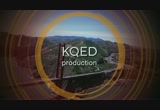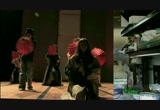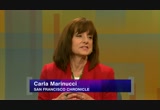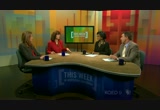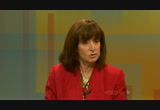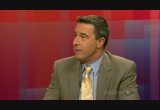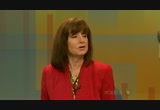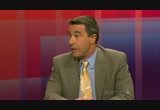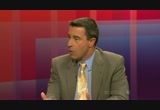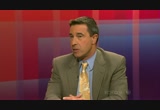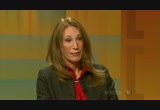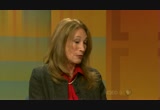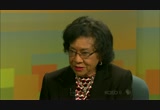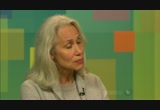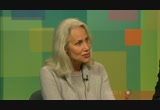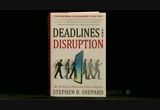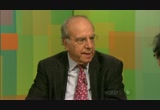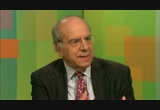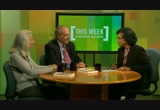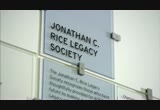tv This Week in Northern California PBS October 13, 2012 1:30am-2:00am PDT
1:30 am
with a tight presidential election less than four weeks away, last night's heated vice presidential debate takes on new significance. both biden and ryan came out swimminging. -- swinging. >> their ideas are old and their ideas are bad and they eliminate the guarantee of medicare. >> here's the problem. they got caught with their hands in the cookie jar, turning medicare into a piggy bank for obama care. >> for the first time in more than three decades, california voters will decide whether or not to abolish the death penalty, and if the state's three strikes law should be reform reformed. the controversy continues over san francisco sheriff ross mirkarimi's future even after
1:31 am
he's reinstated by the board of supervisors. plus writer lynn povich and her husband, steve shepard on journalism's transition to the digital age, coming up next. good evening. i'm belva davis and welcome to this week in northern california. joining me on our news panel tonight are barbara taylor, kcbs city hall reporter and scott
1:32 am
shafer, host of the california report on kqed public radio. and carla marinucci, san francisco chronicle senior political writer. carla, there is so much going on in politics today. let's start with the vice presidential debate. people said they wanted action. what did they get? >> that's right. you could almost hear the cheers coming out of san francisco, the bars and so forth as it was going on this week. a slugfest, a political slugfest. this is what the democrats wanted to see. if joe biden had one job at this event, it was to pump up the base. he did that job this week after obama's disappointing debate. and we saw obama here this week. this was a very busy week in politics. and it is all about enthusiasm in the base in places like san francisco, northern california. if voters here on the democratic side are not enthusiastic about getting out there for obama, if he doesn't have -- if they don't have his back, he's got trouble
1:33 am
in congressional races and fund-raising and everything else. an we saw his events in san francisco this week. we were inside a couple of those events. and, boy, they turned out, they were very excited and he seemed much more fired up. i have to say the last couple of times we've seen him, he has seemed a little too down key, low key, almost sleep walking it seems through some of these events. this week in san francisco in the wake of that debate, he got such terrible reviews, i think he's gotten the message and certainly joe biden has gotten the message that they better pump up the energy. >> san franciscans still don't mind writing those big checks? >> susie tauompkins one of the g democratic donors was there at that alice waters event hugging obama, he was hugging her. all is forgiven. he was a big supporter of hillary clinton. >> is there a lot of grumbling of democrats that the only
1:34 am
reason obama comes here is for the money. that he really spends very, very little time out on the stump talking to people? he really can't even be bothered with that. he views california as a democratic win and moves on to ohio. >> he never does any press events here. he never wants to take any questions from san francisco. >> on this trip to the california, his 17th, he did a public event aimed at the latino vote in the central valley of california where he inaugurated the cesar chavez national monument, the headquarters of the united farm workers. this was a very big deal and it really sort of dramatizes the importance of the latino vote, not just in california but everywhere in these swing states. when you're talking about colorado, nevada, this is a must-win vote. he's ahead by a very wide margin, but you've got to get that vote energized and pumped up. >> coming back to the debate, joe biden, the democrats loved it but he was criticized for
1:35 am
being a little too hot, a little too much smiling, laughing too much and t interrupting. obama had been interrupted for being too cool. is this like the goldilocks debate? too hot, too cool and just right next week? >> obama has a challenge because after being so low key at the first one, he has to come out swinging at the one on tuesday. you know, he can't be two different personalities. but the fact is -- there's a lot at stake at these debates. it's not just about the undecided vote. there's a lot of down ticket races here in california that depend on democrats being excited about getting out there to vote. we heard nancy pelosi this week at willie brown's breakfast. she talked about the democratic chances of getting back the house. they need 25 seats to do that. according to pelosi, that's going to be done. a lot of political strategists say no way, it's not going to happen. but even here in the bay area, you know, there's some seats,
1:36 am
when you talk about jerry mcnurny, these are seats that would go either way and it really depends on democrats getting out there. >> i find some irony that so many democrats didn't like the redistricting process and yet it now appears that they have an opportunity to win seats that they couldn't have gotten otherwise if they had been in charge of redistricting. >> although with the top two primary, though, there's two republicans running against each other. >> or two democrats -- >> or two democrats where the republicans just got booted out of the picture completely. >> down in los angeles it almost came to blows. >> so the political landscape has changed this time around, no question about it. this is why i think the presidential race sort of sets the tone. >> you as a pool reporter, we have to explain what that means. you get a little bit closer and maybe you can even touch the president. i'm not sure about that.
1:37 am
but do you think that with having to say the most important points over and over again as president, that anything he says is going to sound fresh and new? >> it's a very good point, belva, because you said 17 times here in california. on monday alone he did four or five events. three fund-raisers alone in san francisco, the night before a couple in l.a. you have to wonder how many of these you can do. on some days obama is doing six fund-raisers in a single day. i don't know how you keep doing that. some of the people on the inside th wondering is this taking a toll in one way or the other. the endless fund-raising. it's got to be sort of wearing on the candidates, both sides. >> and unlike bill clinton, he's not somebody who really likes to be out pressing the flesh and performing. >> bill clinton came to the bay area this week at uc davis and that's where he delivered just another like bang-up speech.
1:38 am
>> belva: has the latino vote risen to a new plateau in terms of importance? >> absolutely, when you're talking about four million potential voters in california that the democrats are looking at the biggest state. we have the biggest group of latino voters. these are voters that are going to make a difference in every one of these congressional races. and of course we know, it looks like obama is going to win comfortably here in california, but it has changed the landscape of the western united states, particularly in the swing states, nevada and colorado, that are must-win states. so absolutely. >> belva: we're going to move to some of our propositions and i might mention right away that we'll be talking about proposition 30 and 38. that's the education proposition on next week when our entire program will be devoted to education. but scott shafer, you're going to take on the prison stuff tonight. that is the death penalty. >> criminal justice, yes. we've got two ballot measures. prop 34, which would abolish the death penalty in california, replace it with life in prison
1:39 am
without the possibility of parole. you know, the last time the death penalty was on the ballot was 1978. the briggs initiative, proposition 7, an it passed overwhelmingly. and the argument this time against it in part is cost. at least that's what the proponents are saying. there are a lot of people who the death penalty for other reasons. but fundamentally it really isn't happening in california. the leading cause of death on death row is old age or suicide. the death row population has gone from 0 to 730. we haven't had an execution in six years. so there's some people who say, look, let's just get rifd this, it can't be fixed. on the other hand, opponents say wait a minute, it can be fixed with reform, but the legislature won't do the reforms. these things die in committee to speed up the appeals process and things like that. the polls show that it's very tight on prop 34, split right down the middle. so the yes side has a lot of money. they raised about $4 million. the opponents -- there doesn't
1:40 am
seem to be any organized campaign against ending the death penalty. >> one of the arguments i have heard on the other side on this one is if you get rid of the death penalty, it takes away sort of a key bargaining chip that law enforcement has when they're looking at some of these convicted -- or convictions. what about that argument? >> i suppose that's possible. d.a.s overwhelming leo pose prop 34. i think in san francisco there's the only attorney that's in favor of it. so that could be a factor. but your colleague had a story in the "chronicle" a week or so ago that people on death row oppose prop 34 because their appeals will end and they think they won't have a chance to prove their innocence, right? they all think they're innocence. >> don't they still have an opportunity whether they're on death row or not to go through a court process, or does it at some point come to an abrupt end
1:41 am
and they're stuck there? >> currently, you mean? >> no, no, no, not currently. if there is no death penalty, they don't relinquish their right to go through a court process. >> but now there's an automatic appeal for everybody on death row, so they have lawyers provided to them and the state pays for it. not very much, but they do. that would go away. they wouldn't be entitled to that. they would have to do it on their own. >> it has been interesting to me that the argument, which in the past has been almost exclusively a moral issue, an ethical issue. you know, should the state be executing people, no matter what their crime is. and it's gone from that to an economic issue. >> well, and i think that's because -- >> it made it more effective. it's a much better argument. >> i'm sure they based that on the polling and the focus groups show that that is the most effective argument. everyone knows the state is broke so if you end the death penalty, the state would save about $130 million a year.
1:42 am
but, you know, we'll see whether that's -- i think more people probably see we're not executing anybody, so why have it. >> belva: there's another group of people who are in for life, just like some of those on death row, and those are sentenced under the three strikes law. >> yeah. >> belva: there's a movement now to change at least part of the makeup of that law. >> yep, the other ballot measure, prop 36. there are about 26 states that have a three strikes law. california is the only one where the third strike doesn't need to be a serious or violent crime. so you have some people serving 25 to life who in extreme cases, shoplifted something, but they got sentenced under the three strikes law. and so prop 36 would require that that third strike be a serious or violent crime. and if people who are in on a third strike now, whose crime wasn't serious or violent, they could go back and have it resentenced, so it would bring
1:43 am
it more in line with how other states do it right now. >> and who decides what serious is? is there a criteria? >> the penal code. it's written into the penal code. there was a ballot measure a few years ago -- >> what's the difference between this one and that one? >> yeah, prop 66 in 2004. that was leading in the polls. it also would have made the third strike required to be violent but it went further than that and it would have recategorized some crimes and downgraded some crimes so they would no longer be categorized as violent or serious and those prisoners who had been sentenced under those previous serious and violent crimes would have also been affected and gotten a less sentence. it almost passed, but at the last minute a millionaire in orange county spent $3.5 million and arnold schwarzenegger went on tv, he was still popular then and was very effective and it ended up losing narrowly. >> but this doesn't eliminate three strikes, it changes the criteria. >> it changes the criteria.
1:44 am
an it only affects a few thousand people who are currently in prison potentially. and it's gotten pretty broad support. steve cooley, the district attorney in los angeles, was very opposed to that previous ballot measure, is supporting it, along with george gascon. they wrote it together. so this one has much broader support. >> belva: let's look at another part of the criminal justice system. the ability to get a sheriff to run our jail system here has been a long-running soap opera for us. ross mirkarimi got a vote from his friends, he's back reinstated, so now what happens, barbara? >> well, conventional wisdom was by the time we were sitting here this evening, the sheriff, ross mirkarimi, would be out of a job. in fact something else entirely happened. after a nine-hour hearing at the board of supervisors, the vote was 7-4 to reinstate him. it would have taken nine votes to remove him from sheriff.
1:45 am
and just for people who might have been hiding in a cave for the past year, he was -- he found himself in this pred predicament of being accused of misconduct because of a domestic violence incident that occurred on new year's eve in which he got into a fight with his wife and he grabbed her arm and bruised her arm. his wife, eliana lopez, went to a neighbor, recorded a videotape tearfully describing this domestic violence incident. the woman who recorded the video later went to the police and from that point it just snowballed. he was charged with several counts related to domestic violence, and ultimately entered into a plea bargain in which he pled guilty to a charge of false imprisonment. he thought that would be the end of it. instead, mayor ed lee filed official misconduct charges
1:46 am
against him. the charges went to the ethics commission and then this week they landed at the board of supervisors. >> the big mystery is why did the mayor go so far out on a limb on this one? instead of just saying, look, let's let the court system take its role, he really took an aggressive stance and called mirkarimi even a batterer at one point. >> a wife beater. >> yeah, a wife beater. what happens to him -- how much damage has he done politically to himself? >> i think he's done horrible political damage to himself, but let me answer your first question first. i think there are actually two things. first of all, i think he truly believes that ross mirkarimi did commit spousal abuse in a way that rose to the level of official misconduct and that he is, therefore, not fit to serve as sheriff. i think he truly believes that. i also think he was lobbied very, very hard persistently by
1:47 am
domestic violence -- anti-domestic violence advocates in the city and they were very persuasive. and he came to believe that the sheriff should be removed from office. >> you know, i think you could argue that the sheriff has very little to do with domestic violence cases in the city. at the same time, you've got san francisco recently we've learned that the record of the d.a. in prosecuting domestic violence cases is one of the worst in the bay area. a very large number of cases dropped. why isn't there more focus on that from these same anti-domestic violence advocates who were trying to get ross mirkarimi tossed out? >> i can't really answer that question, but i think what happens in situations like this is that it becomes as much about politics and making a symbolic statement as it does about the crime itself, and that's not to say that the crime was or was not serious. it's just that we have the sheriff -- the city's highest
1:48 am
elected law enforcement officer. so it was really a perfect storm of events, that this became an opportunity for domestic violence folks to really focus on the problem, and in the end it back fired. and in answer to your question, i think that the mayor did do damage to himself. he didn't line up his votes ahead of time. you never go and do something like that without knowing who your votes are. the person he appointed supervisor to fill ross mirkarimi's seat voted against him. who does that? >> i think there's probably another chapter, because the d.a. is still suggesting -- >> and there could be a recall. >> yes, right. >> so the saga may not be over, but for the moment, ross mirkarimi is going back to work as sheriff and he'll get back pay on top of that. >> belva: we move now to another issue to lynn povich and steve shepard are both award-winning
1:49 am
journalists with storied careers at major magazines. the husband and wife team have just released books chronicling historic changes on journalism. lynn on women who wanted to be writers at "newsweek" and steve on the industry's turbulent transition to the digital age. i sat down with them last week to discuss their work. >> well, lynn povich and steve shepard, thanks to both of you. you represent great markers in the whole world of journalism. lynn, you and your fight and you making us realize where we are today and how we can survive. but we're going to start first, because we have two women here, steve, lynn, with your book, the good girls revolt. that's a great title. so who were the good girls and what were they revolting against? >> well, i was a good girl. that's part of the reason it's called that. but women who came to "newsweek," we're told if you want to be a writer, go someplace else.
1:50 am
so women who stayed were hired as researchers or fact checkers. the women who wanted to write, when they knew they did like nora ephron and ellen goodman, they left because they knew they'd never be writers. so we good girls stayed and we were the fact checkers until the women's movement started happening and we realized that this not only applied to those women, it applied to us, because we were in a profession where we could not get promoted out of our class. and so we decided to sue for sex discrimination in hiring and promotion. >> and that was early. nobody had done this. >> we were the first women to sue. we sued on march 16th, 1970, when "newsweek" published a cover story on women's lib called "women in revolt" we announced that we were suing them. 46 of us. >> belva: describe, what was it like to be a woman who knew she could not get a job that was going to write anything or get her name into that publication or a by-line ever. >> well, it was considered a
1:51 am
very glamorous job for women because most women, if you remember, were only going to be teachers, nurses or, you know, librarians. and so "newsweek" was an exciting place to work and we worked closely with writers and reporters. it was patriarchal. we couldn't move up. we were the hand maidens to the great writers. and, you know, it was the '60s. there was a lot of sex in the office, a lot of it consensual, a lot of it crossed the line and was sexual harassment. and so it was an interesting mix of women who were raised in the '40s and '50s and then came of age in the '60s. and suddenly we had to challenge everything that we were taught a woman should be and our bosses. >> belva: how hard was it, though, for the women to point it out to their bosses? >> it was very difficult and not every woman made it. as much as we succeeded and opened the doors for many women who came after us including at nbc and "the new york times" and "readers digest," there were
1:52 am
women who could not make the transition who just were raised to enthusiast to think they should get married and have children and the idea of a career, they just couldn't do it. >> belva: steve, you've had all kinds of job, head of "business week" forever and ever, you were director of the journalism school at the city university in new york and now you've written a book, "deadline and disruption." it tries to convince us that the new world of journalism has hope. why do you think that? >> well, i think from a journalistic pointing of view, it is hopeful. journalism has been decentralized by the technology, there are more voices. more people are doing journalism today on more platforms than ever before, and i think that's good. i think technology will enhance journalism. it wills enable us to do crowd sourcing, to engage with communities via facebook and twitter. it will be more participate
1:53 am
tore. we can skype interviews in faraway places so there's a lot of things to be hopeful for. we can engage communities, that's what i'm hopeful for. the part that i'm worried about is a financial question, how are we going to support quality journalism in the digital age. what is the appropriate business model for the new world. >> belva: steve, are the opportunities for originality and enterprise, one would think it might be because of the plentiful ways that news gets put together? >> yes. and i think that in this day and age ordinary commodity generic stories are not going to do it for in audience. it has to be original, it has to be enterprising because there's all this information out there and you need to stand out by doing original, creative, enterprising stories they can't get anywhere else. >> belva: lynn, your book is all about a passionate revolt. and, steve, yours is all about a technology-driven revolt that
1:54 am
all of us can find some fault with. i was trying to see if there was any commonality between the passion for equality and the acceptance of the now, which is the way that i'm sort of seeing this. >> well, i think that technological change becomes inevitable. there's no stopping it and it's not subject to human whims and, well, we'll do this, we won't do that. when technology happens to us, newspapers, magazines, broadcasts have to change because the technology is an imperative. whereas in lynn's case, it seems to me that it was more human choice and judgments going on and more passion in a way. >> well, i think because we wanted to be journalists and we couldn't be journalists, and so our landmark lawsuit opened the door for so many women, just as you have in your career. i'm hopeful that the digital revolution, which has been
1:55 am
pretty male dominated initially with the internet, but with social media, i think it is a strength that speaks to women's strengths. we have networks, we connect with other people, we like to do that kind of media, and i'm hopeful that actually women will be able to jane a higher footing than they have. >> belva: two interesting books, what it was like to be a woman in the early years, we'll call them early years now for women in the business. my thanks to both of you. >> thank you. >> thank you, belva. >> belva: well, that's all for tonight. i want to thank our guests for joining us here. remember to visit kqed.org/thisweek for the archives of our shows and to subscribe to our news letter and our podcast and to share your thoughts with us. a correction on a remark earlier. our education special dealing with proposition 30 and 38 will air on october 26th. we will also have a live
144 Views
IN COLLECTIONS
KQED (PBS) Television Archive
Television Archive  Television Archive News Search Service
Television Archive News Search Service 
Uploaded by TV Archive on

 Live Music Archive
Live Music Archive Librivox Free Audio
Librivox Free Audio Metropolitan Museum
Metropolitan Museum Cleveland Museum of Art
Cleveland Museum of Art Internet Arcade
Internet Arcade Console Living Room
Console Living Room Books to Borrow
Books to Borrow Open Library
Open Library TV News
TV News Understanding 9/11
Understanding 9/11